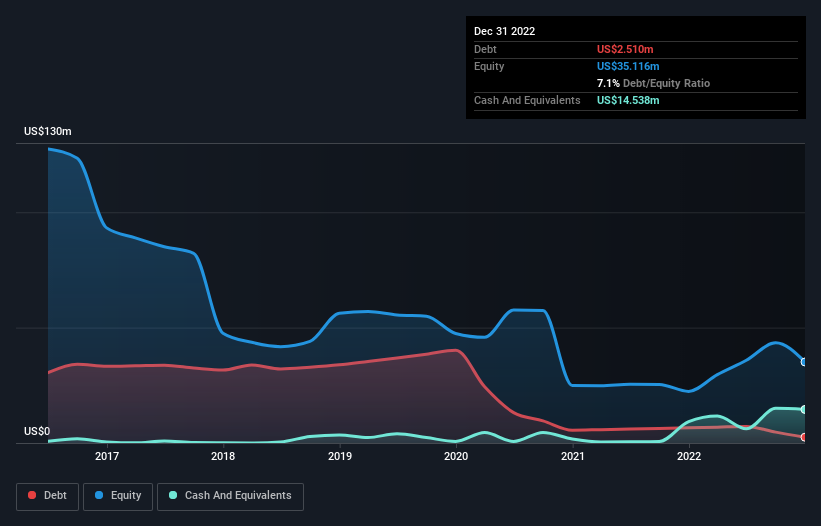Warren Buffett famously said, 'Volatility is far from synonymous with risk.' When we think about how risky a company is, we always like to look at its use of debt, since debt overload can lead to ruin. Importantly, Tethys Petroleum Limited (CVE:TPL) does carry debt. But the real question is whether this debt is making the company risky.
Why Does Debt Bring Risk?
Debt assists a business until the business has trouble paying it off, either with new capital or with free cash flow. In the worst case scenario, a company can go bankrupt if it cannot pay its creditors. While that is not too common, we often do see indebted companies permanently diluting shareholders because lenders force them to raise capital at a distressed price. Of course, plenty of companies use debt to fund growth, without any negative consequences. The first thing to do when considering how much debt a business uses is to look at its cash and debt together.
See our latest analysis for Tethys Petroleum
What Is Tethys Petroleum's Debt?
The image below, which you can click on for greater detail, shows that Tethys Petroleum had debt of US$2.51m at the end of December 2022, a reduction from US$6.58m over a year. But on the other hand it also has US$14.5m in cash, leading to a US$12.0m net cash position.

How Strong Is Tethys Petroleum's Balance Sheet?
According to the last reported balance sheet, Tethys Petroleum had liabilities of US$19.7m due within 12 months, and liabilities of US$32.5m due beyond 12 months. Offsetting these obligations, it had cash of US$14.5m as well as receivables valued at US$7.94m due within 12 months. So its liabilities outweigh the sum of its cash and (near-term) receivables by US$29.7m.
While this might seem like a lot, it is not so bad since Tethys Petroleum has a market capitalization of US$53.6m, and so it could probably strengthen its balance sheet by raising capital if it needed to. However, it is still worthwhile taking a close look at its ability to pay off debt. While it does have liabilities worth noting, Tethys Petroleum also has more cash than debt, so we're pretty confident it can manage its debt safely.
Even more impressive was the fact that Tethys Petroleum grew its EBIT by 788% over twelve months. If maintained that growth will make the debt even more manageable in the years ahead. When analysing debt levels, the balance sheet is the obvious place to start. But you can't view debt in total isolation; since Tethys Petroleum will need earnings to service that debt. So when considering debt, it's definitely worth looking at the earnings trend. Click here for an interactive snapshot.
But our final consideration is also important, because a company cannot pay debt with paper profits; it needs cold hard cash. Tethys Petroleum may have net cash on the balance sheet, but it is still interesting to look at how well the business converts its earnings before interest and tax (EBIT) to free cash flow, because that will influence both its need for, and its capacity to manage debt. Looking at the most recent two years, Tethys Petroleum recorded free cash flow of 44% of its EBIT, which is weaker than we'd expect. That's not great, when it comes to paying down debt.
Summing Up
Although Tethys Petroleum's balance sheet isn't particularly strong, due to the total liabilities, it is clearly positive to see that it has net cash of US$12.0m. And it impressed us with its EBIT growth of 788% over the last year. So we are not troubled with Tethys Petroleum's debt use. There's no doubt that we learn most about debt from the balance sheet. However, not all investment risk resides within the balance sheet - far from it. For example - Tethys Petroleum has 3 warning signs we think you should be aware of.
If you're interested in investing in businesses that can grow profits without the burden of debt, then check out this free list of growing businesses that have net cash on the balance sheet.
Valuation is complex, but we're here to simplify it.
Discover if Tethys Petroleum might be undervalued or overvalued with our detailed analysis, featuring fair value estimates, potential risks, dividends, insider trades, and its financial condition.
Access Free AnalysisHave feedback on this article? Concerned about the content? Get in touch with us directly. Alternatively, email editorial-team (at) simplywallst.com.
This article by Simply Wall St is general in nature. We provide commentary based on historical data and analyst forecasts only using an unbiased methodology and our articles are not intended to be financial advice. It does not constitute a recommendation to buy or sell any stock, and does not take account of your objectives, or your financial situation. We aim to bring you long-term focused analysis driven by fundamental data. Note that our analysis may not factor in the latest price-sensitive company announcements or qualitative material. Simply Wall St has no position in any stocks mentioned.
About TSXV:TPL
Tethys Petroleum
Engages in the acquisition, exploration, and development of crude oil and natural gas fields in Kazakhstan.
Excellent balance sheet and slightly overvalued.
Market Insights
Community Narratives


Recently Updated Narratives

Astor Enerji will surge with a fair value of $140.43 in the next 3 years

Proximus: The State-Backed Backup Plan with 7% Gross Yield and 15% Currency Upside.


A case for for IMPACT Silver Corp (TSXV:IPT) to reach USD $4.52 (CAD $6.16) in 2026 (23 bagger in 1 year) and USD $5.76 (CAD $7.89) by 2030
Popular Narratives


MicroVision will explode future revenue by 380.37% with a vision towards success


The company that turned a verb into a global necessity and basically runs the modern internet, digital ads, smartphones, maps, and AI.



